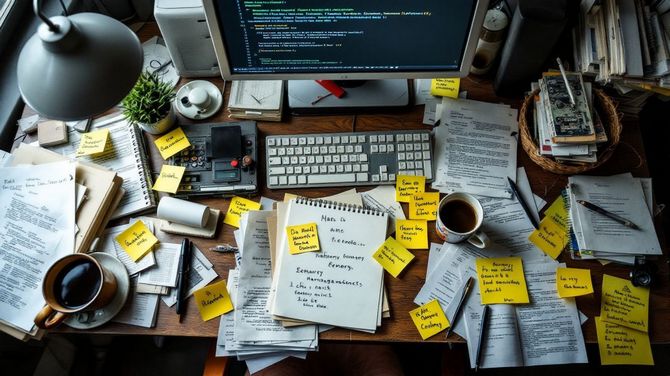Mastering Memory Management in C and C++

Managing memory in C and C++ can be tricky. You might face crashes or slow programs because of bad memory usage. Good news – mastering advanced techniques can fix these problems. One cool fact is that modern C++ has tools to make managing memory easier and your programs faster. This blog will cover those new tricks, from dynamic allocation to smart pointers. Get ready to boost your code with our tips! Keep reading to learn how. Dynamic Memory Allocation in C++ In C++, we use dynamic memory to make programs more flexible. We can create variables while the program is running and remove them when we don’t need them anymore. This way, your computer doesn’t run out of space quickly. To do this, C++ has tools like “new” for making things and “delete” for cleaning up. It’s like having a magic wand that lets you control exactly how much memory your software uses. New Operator Usage Managing memory in computer programs is crucial. The New operator in C++ makes this easier. Here’s how: Use the New operator to create space for an object in heap memory. This space holds data later. This operator does more than just allocate space; it also calls the constructor of a class, setting up the object. If there is not enough memory, New throws an exception. This helps prevent your program from crashing. Unlike malloc() in C, you don’t need to say what type of data you are creating space for with New. It figures it out on its own and sizes everything right. You can also use New for creating arrays in heap memory, making it flexible for different needs. Using the New operator helps manage memory better in C++ programs by simplifying creation and setup of objects and handling errors more smoothly. Delete Operator Usage Deleting objects correctly is key to preventing memory leaks in C++. Memory leaks happen when programs don’t free up memory that is no longer needed. Here’s how to use the delete operator right: Use delete to remove a single object created with new. This frees up the space. For an array, use delete[] instead. It clears all items in the array. Pair every new with a delete. If you create with new, always erase with delete. Pay attention to pointers. After deleting, set your pointer to nullptr. This stops wild pointers. Be careful with shared resources. Make sure you only delete what you truly own. Understand ownership rules in your codebase for safe deletes without double freeing or skipping necessary cleans up. Regularly check for memory leaks during testing phases. Learn how smart pointers like std::unique_ptr can manage deletes for you automatically, making manual deletes less needed. Following these steps helps keep your program free from memory leaks and errors related to incorrect deletion of dynamically allocated memory. Memory Management in C In C, managing memory is like handling raw ingredients in a kitchen. You use tools like malloc to measure out exactly how much space you need. Then, when you’re done, you clean up with free to make sure there’s no waste left behind. Malloc Function Utilizing Malloc in C is an essential component of manual memory control. It facilitates securing a certain quantity of computer memory for your application. Malloc is an abbreviation for memory allocation. This function requests memory of a particular size that you define. You must specify the quantity of memory needed, quantified in bytes. The sizeof operator, combined with data types or structs, is typically used to determine the size. If sufficient space is accessible, Malloc allocates a pointer initiating that segment. This pointer enables your application to identify the starting point of its allocated memory. If Malloc fails to locate sufficient free space, it generates a null pointer. A null pointer indicates that your memory request was unsuccessful – there wasn’t sufficient free memory. It is important to verify if the pointer isn’t null before utilizing the memory to avoid errors. The type of pointer generated by Malloc is void*. Hence, you must change it to the correct pointer type you’re dealing with. This type conversion is performed with typecasting in C. For instance, if an array of integers is needed, you cast it like so: (int*). It’s crucial to release this space post usage – that’s when the free function becomes useful. Utilizing Malloc and manually controlling memory can initially seem challenging, but mastering it leads to superior control over how your C programs operate and utilize resources. Free Function Releasing memory is essential in C programming. The free function allows us to manage this by eliminating space that is no longer required. Implement the free function post malloc: It’s essential to invoke free() corresponding to every memory segment acquired with malloc(). This serves to avoid memory leaks. Post-free, pointer becomes null: On utilizing free(), your pointer variable doesn’t retain the memory location anymore. It’s recommended to assign your pointer to NULL post-freeing it to prevent inadvertent usage. Inappropriate use leads to errors: Attempting to free an area not allocated with malloc or already freed can lead to your program crashing or behaving unpredictably. Double freeing leads to issues: Freeing a pointer variable twice results in undefined behavior, frequently leading to difficult-to-trace errors. Memory leaks occur in absence of free: Failing to use free() results in your program retaining memory even when it’s unnecessary, potentially causing system slowdowns or crashes over time. Dynamic arrays also require freeing: On dynamically creating an array using malloc, ensure to release it with free() once done to maintain clean and available memory. Free is compatible with calloc and realloc too: Similar to malloc, if you’ve implemented calloc or realloc, make sure to utilize free() for clean up. Pre-freeing inspection: It’s wise to check if your pointer is not NULL pre-invoking free(). This prevents attempts to free something that’s not allocated, potentially causing issues. Steer clear of dangling pointers: Post-freeing memory, if any other pointers were indicating that



